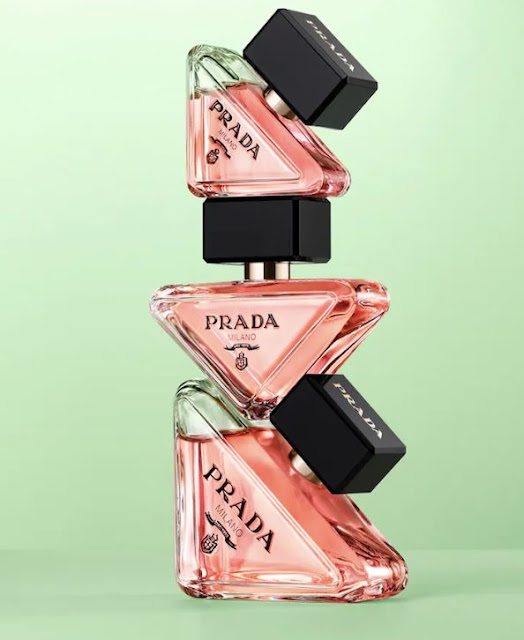
Now there's an interesting question for the new year! Isn't it?
The poll we conducted here at Perfume Shrine was intriguing on many levels, none the less important because it revealed certain finer points.
First of all, the poll confirmed that the people who activately participate in such projects are astounding less numerous than the actual readership. I don't know why the literally hundreds of people who visit every single day didn't want to cast a vote: perhaps they were not familiar with all the fragrances and didn't want to skew the poll by opting for something that might overshadow something else. Perhaps they don't believe in polls anyway. Perhaps they didn't deem any of the choices worthy, even. And to tell you the truth, the term "best" is quite binding and loaded for such a subjective matter as taste. Truthfully, in terms of innovation and vision, it was the smaller brands that made the grade for me. But since their offerings are not yet being discussed extensively (I am confident they will be soon!), it was inevitable that well-known brand names would be opted for as the gladiator contestants.
And they crossed their swords quite forcefully too! Apart from two choices of course, predictably the
men's mainstream launches by Dior and Calvin Klein who tied with only one vote each.
This last part is indicative of two things to my mind: first, that our male readership is either rather limited (as is generally the case with perfume venues anyway) or much more demanding (a welcome thought). And secondly, that despite a few examples, much of the masculine fragrance launches by mainstream companies are simply unispiring, lacklustre and utimately dull.
The reason that I personally opted to include Dior
Fahrenheit 32 over the more sympatico to my sensibilities
Fleur du Mâle by Gaultier was due to the dire need to include at least
one Dior offering: they had come out with two major launches this year, a move which resonates loudly throughout the buying audiences whatever we might say about the brand in recent years.
Midnight Poison fell rather short of expectations and merely perpetuated
the rose-patchouli accord we have come to sniff so regularly these past 2 years, leaving us with only the majestically gothic commercial and wonderful dark bottle to swoon over. Therefore the headstart of
Fahrenheit 32 in the innovation stakes (abstract orange blossom in a men's fume) won the day.
Calvin Klein issued his first masculine fragrance
Calvin Klein Man that didn't have a feminine counterpoint. The experiment wasn't bad, but it wasn't terribly bold either. Still, it is a major brand that accounts for lots of sales, therefore the inclusion. The fact that it wasn't voted for speaks for its relative diminished appeal in discerning circles.
The doyenne of the pretty, the
Estée Lauder group, issued one of the most surprising launches of this year,
Private Collection Tuberose Gardenia. A scent that repositions the brand into a more exclusive plane that had already begun with Tom Ford's efforts a couple of seasons ago. But here is the tour de force: they did it with a beautiful fragrance that smells true, stays on long and doesn't cost the small fortune other brands ask for. Bravo Aérin Lauder on a well done feat! I am sure that the 11% of our readers who chose it as best scent of 2007 has a use for a white floral fragrance that makes them feel simply gorgeous when they step out to face the world.
Prada did a comparable thing with their lovely
Infusion d'Iris, going through a different marketing route, that of
masstige: supposedly costly ingredients in a classy bottle with the crest of tradition but available through Sephora and larger stores. Hence the 16% piece of the pie Prada snatched in this poll we conducted.
Infusion d'Iris is unapopogetically pretty, classy, notably well suited to both sexes and distinct even if relying on less costly materials than touted (please note that they do
not list the origin of iris on the packaging, contrary to the commercially cunning demonstration of other ingredients right in front of your eyes ~which points to the use of aromachemicals). In the year of iris, from Guerlain
Iris Ganache to
Iris Pallida by L'artisan, Prada's iris is a great option.
 Hermès
Hermès simply reconfirmed what they are after: individual, aesthete concepts that do not concern themselves much with trends. Despite
Kelly Calèche having this rather gauche name, I might add ~borrowing from a previous scent (OK, this is standard practice among houses lately) but also from an actual accessory of the brand that acts as a status symbol: the Kelly bag (how transparently manipulative is that?). Additionally, the advertorials that talked about a leather floral did the scent a disservice, as did the naughty, defiant ad: had they mentioned a slight suede note, they might not had disappointed the die-hard leather fans who expected a potent mix of
Cuir de Russie calibre. Instead they found a cool, composed, pretty feminine floral with the slightest whiff of smooth
velvetine that hypnotises with its devious sillage and great tenacity. I predict that the fragrance will be vindicated in perfume circles for its meek 6% vote in no more than 3 years' time: note this comment, you have heard it here first!
Bond No.9 made the most surprising entry of this year with their best yet release:
Andy Warhol Silver Factory, the first of a series of instalments centered on the pope of Pop Art. Due partly to its release late in the year and its relative obscurity, it lagged in votes garnering only 5%. Yet this delectable incense is worth seeking out and although the big, really expensive bottles of Bond No.9 are often too costly for what they fragrantly bear, this one heralds a new leaf in the Bond book. If it is anything to go by, I am looking forward to their other Andy Warhol inspired scents soon.
Not so with Serge Lutens: this year has been a sort of let-down for his many, arduous fans who have come to expect the world from him. Whether this has to do with Chris Sheldrake getting a position at Chanel or with the rampant rumous of Serge Lutens himself getting slowly out of fragrance creation and focusing on makeup, it remains to be seen.
Sarrassins was lovely, beautiful and with a slight animalic edge, but it didn't bring out the
frisson we have come to expect from an exclusive Lutens!
Louve is even less edgy, despite its smooth, fluffy qualities. But more on that on an upcoming review shortly...
Gucci by
Gucci garnered a 5% percentage for much the same reason as Bond's
Silver Factory: coming out late in the year and not yet available in all markets, it hasn't registered enough into people's minds to get more votes. Or the new chypres have become a little too predictable for their own good, like I had mentioned on
my musings for 2007 in fragrance. Personally I haven't smelled this yet, so all bets are off till I do. But somehow I am not too excited.
Chanel and Guerlain proved again that they are considered sacred cows of the perfume world and that their new scents always make a ripple in the stagnant pond of new launches of mainstream brands. Despite the fact that both choices (
Spirituelle Double Vanille from Guerlain which won the race by a thread and
31 Rue Cambon by Chanel) were rather exclusive to begin with lots of our discerning readers had a keen interest to sample them whatever it took, exactly because they were Chanel and Guerlain.
No matter how disillusioned perfume lovers might have become in general,
Guerlain still is a bastion of rich perfume history and their adherence to their illustrious tradition with their boutique scents is worth the trouble of locating the elusive juices. One might argue that their practice of re-issuing past discarded experiments under new wraps is akin to the Emperor's new clothes (
Mahora I am looking at you!). But still, the myth is going strong encased in opulent bottles.
Spiritueuse Double Vanille is one of the loveliest vanillas out there and this is coming from someone who isn't enamoured with vanilla in the first place. Rich, pod-like, it possesses the vibrancy of trails of smoke lifting off for a flight of orientalised arabesque.
Last but not least, vanilla is an easier concept to like for the majority of people than a chypré floral, accounting for 23% versus 22%.
Chanel is equally respected for their history and austere class, perpetuated through lore, imagery and elegant packaging that accounts for much of the brand's cachet. If anything, they are the most recognised brandname throughout the world in luxury apparel and cosmetics and everyone, simply everyone, has come into -direct or indirect- contact with
No.5 at some point in their lives.
31 Rue Cambon was announced as the new revolution in the industry that would put the chypre genre back in the map, following
the restrictions of oakmoss percentage, by opting for a new accord (pepper and iris, reportedly) that would bypass the problem in the most elegant way.
Chypre didn't need re-invention: it is as iconic a notion to fragrance as it is lamentably obsolete ~the perfume police have made sure that none of the mainstream chypre perfumes of yore will ever be exactly the same. But chypre might have needed re-orchestration, reagrdless, so as to appeal to a new audience which isn't tied up into the legend of yesterday and isn't as involved in the terminology and greater onomastics rather than in what a fragrance exudes.
31 Rue Cambon indeed manages to smell elegant, confident, classy, like old money. It doesn't try too hard and this is its charm. But also its possible downfall. In the years to come it might be bypassed by bolder creations, such as the more old-fashioned
Cuir de Russie or
Bois des Iles, exactly because they are arresting compositions. And therefore if it is to become a classic, it will have to shed at least some of its exclusivity in order to become more well-known to wider audiences who are the ones who validate a fragrance through continuous, ardent loyalty through the decades.
All in all, 2007 proved that there is yet hope for the fragrance industry. Let's see how smartly they interpret the feedback.
Pic by whatktdoes.com, bottle of Kelly Caleche from Hermès
.jpg)


















.jpg)




.jpg)








